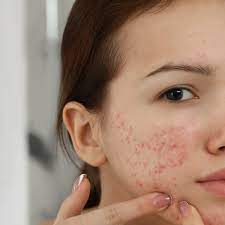Acne is one of the most common skin conditions affecting individuals of all ages, and it can often feel like an uphill battle. From hormonal changes during adolescence to stress and lifestyle factors, pimples can pop up unexpectedly, impacting not only our skin but also our self-esteem. Fortunately, various treatment options can help manage and clear acne, allowing us to reclaim our confidence. In this article, we will explore the different Pimples Treatment in Abu Dhabi helping you find the path to clearer skin.
Understanding Acne and Its Causes
Before diving into treatment options, it’s essential to understand what causes pimples. Acne occurs when hair follicles become clogged with oil (sebum), dead skin cells, and bacteria. Several factors contribute to this process, including:
- Hormonal Changes: Hormonal fluctuations during puberty, menstruation, pregnancy, or stress can lead to increased oil production.
- Genetics: A family history of acne can increase your likelihood of developing it.
- Diet: High-glycemic foods and dairy have been linked to acne in some studies.
- Skin Care Products: Using the wrong products can irritate the skin or clog pores, exacerbating acne.

Topical Treatments for Acne
1. Over-the-Counter Products
Many effective acne treatments are available without a prescription. Look for products containing active ingredients like:
- Benzoyl Peroxide: This ingredient kills acne-causing bacteria and helps unclog pores. It can be found in gels, creams, and cleansers.
- Salicylic Acid: Known for its exfoliating properties, salicylic acid helps to remove dead skin cells and reduce inflammation. It’s often included in cleansers and spot treatments.
- Retinoids: These vitamin A derivatives promote cell turnover and prevent clogged pores. Over-the-counter retinoids, like adapalene, can help reduce acne and improve skin texture.
2. Prescription Topical Treatments
For more severe or persistent acne, a dermatologist may prescribe stronger topical treatments, including:
- Topical Antibiotics: These help reduce bacteria on the skin and inflammation. Clindamycin and erythromycin are commonly prescribed options.
- Retinoid Creams: Prescription-strength retinoids can be more potent and effective than over-the-counter versions, addressing both acne and signs of aging.
Oral Medications for Acne
3. Antibiotics
For moderate to severe acne, oral antibiotics may be prescribed to reduce bacteria and inflammation. Common options include doxycycline and minocycline. These are usually taken for a limited period to avoid antibiotic resistance.
4. Hormonal Treatments
For women experiencing hormonal acne, oral contraceptives can help regulate hormones and reduce breakouts. Some formulations specifically target acne, providing dual benefits of birth control and skin improvement.
5. Isotretinoin
For severe, cystic acne that hasn’t responded to other treatments, isotretinoin (commonly known as Accutane) may be an option. This powerful medication can significantly reduce oil production and prevent future breakouts, but it comes with potential side effects and requires careful monitoring by a dermatologist.
Professional Treatments
6. Chemical Peels
Chemical peels involve applying a chemical solution to the skin to exfoliate and remove dead skin cells. This treatment can help improve skin texture, reduce acne scars, and prevent future breakouts. Peels can vary in strength, and a dermatologist can recommend the right type for your skin.
7. Laser and Light Therapy
Laser and light treatments can target acne by reducing bacteria, oil production, and inflammation. These treatments can also improve skin texture and reduce redness associated with acne.
8. Extraction Procedures
For stubborn cysts or comedones (blackheads and whiteheads), a dermatologist may perform extraction procedures to manually remove the blockage, promoting faster healing.
Alternative and Complementary Treatments
Herbal Remedies
Some people find relief from acne through herbal remedies, such as tea tree oil or green tea extract. These natural options may help reduce inflammation and bacteria, though individual results can vary. Always conduct a patch test before using new topical products to ensure no adverse reactions occur.
Probiotics
Emerging research suggests that probiotics may help improve skin health by balancing gut bacteria and reducing inflammation. While more studies are needed, incorporating probiotic-rich foods like yogurt or considering a supplement could be beneficial.
Conclusion
The journey to clear skin is often a personal and transformative experience. With numerous pimple treatment options available, from over-the-counter products to professional procedures, there is a solution for everyone. The key is to find the right combination of treatments that work for your unique skin type and concerns. Consulting a dermatologist can provide personalized guidance and help you develop a tailored plan for achieving and maintaining clear, healthy skin.
FAQs
1. How long does it take to see results from acne treatments?
Results can vary depending on the treatment used, but most patients start to see improvements within four to eight weeks of consistent use.
2. Can diet really affect acne?
Yes, some studies suggest that high-glycemic foods and dairy products may contribute to acne flare-ups. A balanced diet can help improve overall skin health.
3. Is it safe to pop pimples?
Popping pimples can lead to scarring, infection, and more breakouts. It’s best to avoid this practice and use appropriate treatments instead.
4. What should I do if my acne worsens with treatment?
If your acne worsens or doesn’t improve with over-the-counter treatments, consult a dermatologist for a personalized evaluation and treatment plan.
5. Are there any home remedies that work for acne?
While some home remedies may provide temporary relief, they are often not as effective as clinically tested treatments. Always consult with a dermatologist before trying new remedies.
